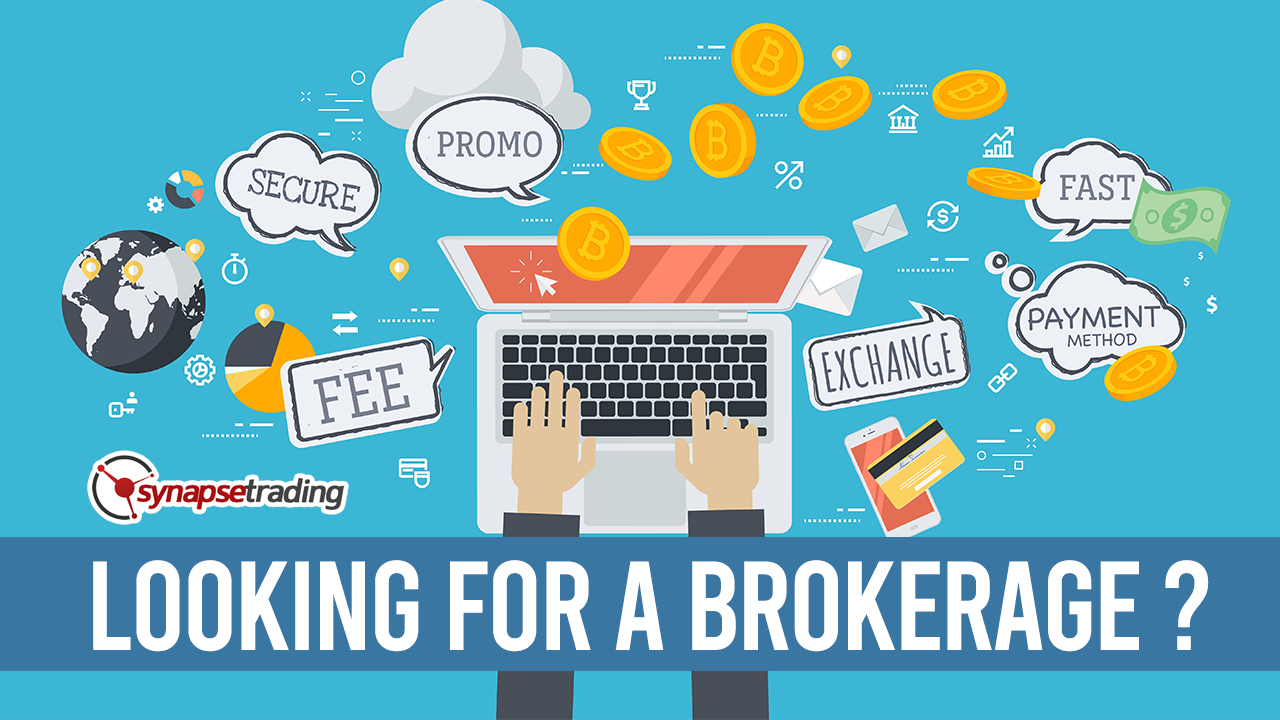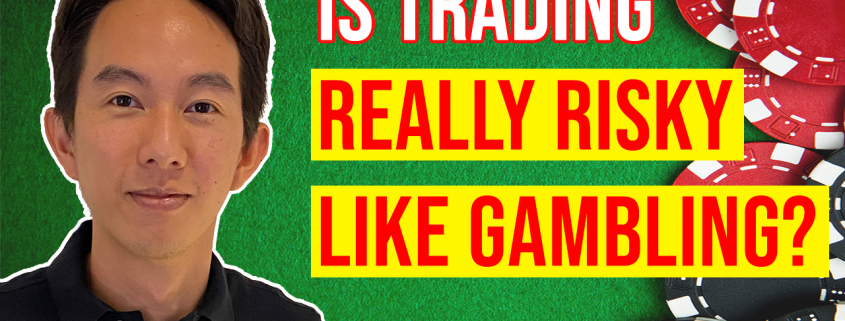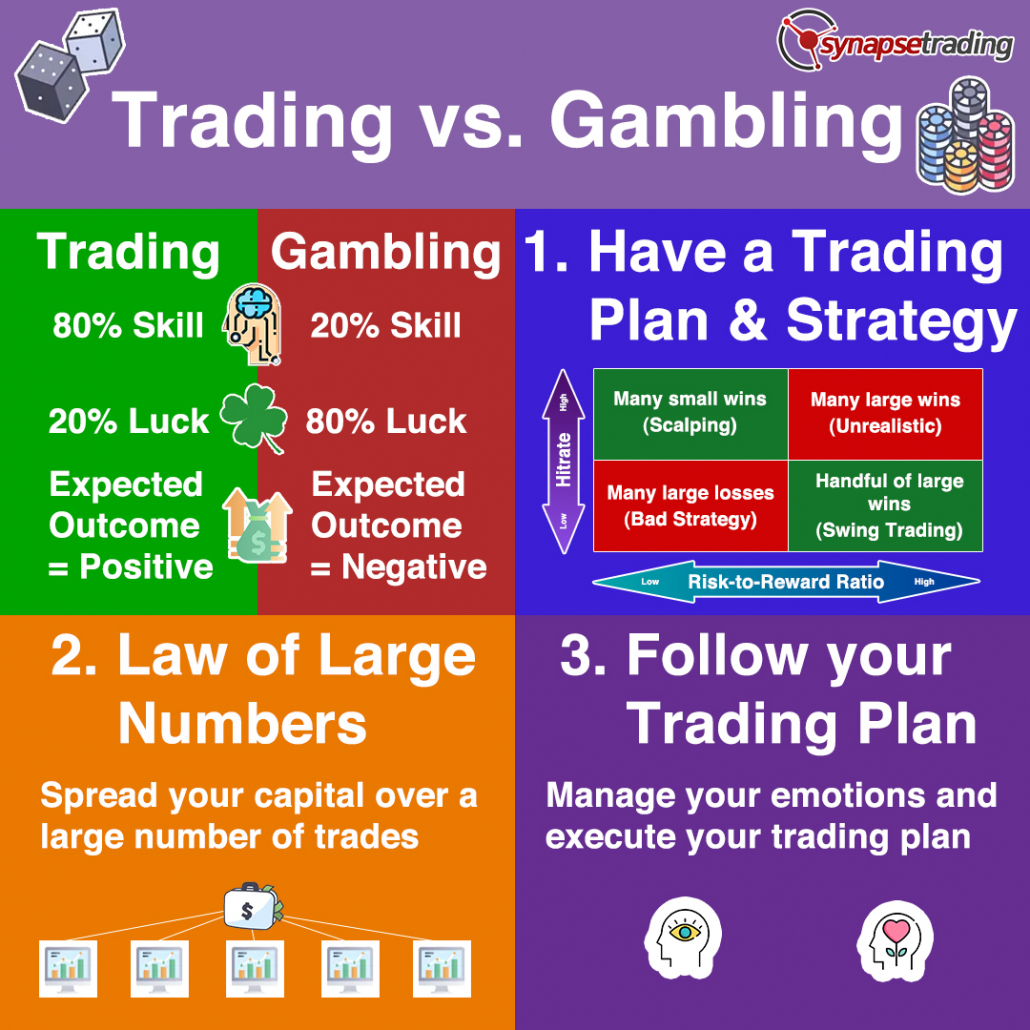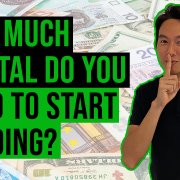Is Trading Gambling? (How to Profit Consistently Like a Casino)
Join our Telegram channel for more market analysis & trading tips: t.me/synapsetrading
You have probably heard horror stories of people losing all their hard-earned money in the financial markets, or even going into debt.
This makes you wonder if you should avoid any form of high risk trading or investing, and just stay away from the financial markets.
But is trading really that risky? Is trading gambling, similar to a night at the casino? Is the chance of losing everything really that high?
Or is there a proper way you can do it safely?
In this blog post, I’m going to talk about the risks of trading and investing, discuss the question “is trading gambling?”, and whether it is the same as gambling in the casino.
Table of Contents
Similarities of Trading & Gambling
Most people agree that gambling is definitely risky, and is a sure-lose proposition in the long run. And I don’t dispute that.
What about trading then? Is it the same? Is trading gambling?
At first glance, trading appears to be very similar to gambling, which is why many people tend to lump them together, and deem it to be intrinsically risky, with the high possibility of a huge loss.
However, while there are some similarities, there is actually a major difference between these two activities.
Firstly, for the similarities.
Trading and gambling both involve a certain element of luck and skill, as well as probabilities and uncertainties.
If I had to make an estimate, I would say 80% skill and 20% luck, if you are trading, but 20% skill and 80% luck if you are gambling.
Both present the opportunity to make or lose huge amounts of money in a short period of time, depending on your skill level.
That is why both pursuits require good money management skills and strong psychology.
Is Trading Gambling? (It Depends on Your Edge)
However, there is one big difference – the mathematical edge.
So to answer the question of “is trading gambling?”, whether you are trading or gambling depends on whether you have the edge.
Simply put, this refers to whether probability is on your side.
If you are a professional trader or a professional gambler, and you have the edge, then you will likely be profitable in the long run.
If you have no idea what you are doing when trading or gambling (you do not have the edge), then you will most likely lose in the long run.
In a casino, since most people have no idea what they are doing, and most people are just there to have fun, the casino usually has the edge, and hence it wins most of the time.
So in order for you to beat the casino, or other players in the financial markets, you need to have an edge.
As I covered in my other posts, your trading plan and trading journal should help you develop that edge.
What is Expected Outcome in Trading?
Before I move on, let me explain what this edge is all about.
To do that, we need to bring in the important concept of “expected outcome”.
Without going into the detailed math (which I have covered in another post), the “expected outcome”, or E(X), tells you whether your strategy is profitable in the long run.
If your expected outcome is positive (more than zero), it means that over the long run, your strategy does have the edge, and you will be profitable.
On the other hand, if your expected outcome is negative (less than zero), then it means that over the long-run you will lose money.
How to Calculate Expected Outcome
How then, is this expected outcome calculated?
It depends on 2 main factors, namely:
- Your hitrate (or winrate)
- Your reward-to-risk ratio (RRR for short)
Your hitrate is your winning percentage, for example a 70% hitrate means you win 70% of the time, and lose 30% of the time.
Your RRR is the ratio of how much you make when you win, versus how much you lose when you are wrong.
When you combine these 2 components, you can calculate your expected outcome, which will tell you whether you have the edge.
In trading, doing your analysis and taking a calculated risk tilts the probability in your favour, while in gambling, such as in a casino, the odds are always against you.
How Often Do You Need to Win to Be Profitable?
Some people have asked: Is it possible to make money if you only win 40-50% of the time?
The answer is yes.
If you make more money when you win, as compared to your losses when you lose.
For example, if you make 2-3x returns whenever you win, but only lose 1x when you are wrong, and you win 50% of the time, your expected outcome is still positive.
So it really depends on the strategy which you are using.
There are many different types of strategies, with different combination of hitrate and RRR, which can all give a net positive outcome.
For example, you could have a lower hitrate and high RRR, like the one mentioned above, or you could have a higher hitrate and lower RRR.
In a sense, this is a trade-off, but you just need to find the right balance of hitrate and RRR that gives you a positive expected outcome.
How to Beat the Casino
Another important concept is the law of large numbers.
We previously established that if you have the edge, your expected outcome is positive, and you will be profitable in the long-run.
But how do we ensure that you last long enough to take advantage of the long run?
In other words, how do we ensure that you do not blow up your account (lose all your capital) before you are able to utilize that trading edge?
In statistics, the law of large numbers states that the larger your sample size (the number of times you trade or gamble), the closer your outcome will be to the expected outcome.
So, the solution is actually quite simple.
All you need to do is to make sure you spread out your money over many trades. Because the more trades you take, the more likely your results will match the expected outcome (which is positive).
In gambling, since you do not have the edge, your best bet is to actually do the opposite, which is to take a handful of large bets, and quit the moment you’re up, because the longer you play, the more likely you will lose money in the long run.
By doing so, you can take away the edge that casinos have.
On the other hand, if you have the trading edge but you do not manage your money well, then you are taking away the edge that you have.
At this point, if you are still wondering “is trading gambling?”, the strategy for gambling and trading are exact opposites.
Can You Follow the Plan?
One other important factor to consider is the psychological and emotional aspect of trading/gambling.
Because money is at stake, many people are unable to make logical decisions or execute their strategy systematically.
If you have a strategy which has an edge, but you execute it differently, then you are either giving up that edge, or worse, changing your strategy into one which has a negative expected outcome.
For example, if you do not fully optimize your winning trades (taking profit too early), or you do not manage your losses well (not cutting losses), then your RRR will change drastically.
This is because your reward will be lower than expected, and your risk will be higher than expected, so your overall RRR will be much worse.
This could be enough to destroy whatever edge you have, and tip your expected outcome from a net positive to a net negative.
It doesn’t make sense to come up with a great strategy and trading plan, and then choose not to follow it due to conflicting emotions.
Concluding Thoughts
In conclusion, the greatest risk is not trading or gambling, but rather the player.
The risk involved is not dependent on the activity itself, but rather the expertise and experience of the person doing it.
Professional poker players (who are not gamblers) win because they do not play by pure luck (gambling), instead they use a system that gives them an edge over other players in the long run.
The reason why people lose big in trading is because they trade without a method or system which gives them an edge, or even if they do have an edge, they do not take full advantage of the edge, and instead take single large bets instead of many small bets.
This is why position-sizing, capital allocation and risk management are such essential concepts in trading.
Emotions, such as greed and hope, also tends to cloud better judgment even when one should know better, and erodes the trading edge in their strategy.
Most traders tend to see only the upside in their trades, and not the downside, hence they sell quickly once they see a profit, but hold on to losses in hope that these would turn around.
These are the main reason why many traders who have the edge are still unable to grow their accounts.
So if you want to be profitable in trading, just keep in mind these 3 things:
- Have a trading plan & strategy which gives you an edge
- Spread your capital over a large number of trades
- Manage your emotions and execute your trading plan
Now that I have shared the main difference between trading and gambling, do you still think that trading is as risky as gambling? How will you explain if someone asks you “is trading gambling?”, and what is the difference?
Let me know in the comments below!
 Our flagship mentoring program is suitable for both beginners and advanced traders, covering the 4 strategies which I used over the past 15 years to build up my 7-figure personal trading portfolio.
Our flagship mentoring program is suitable for both beginners and advanced traders, covering the 4 strategies which I used over the past 15 years to build up my 7-figure personal trading portfolio.
 If you're looking for a reputable brokerage that covers all products (SG stocks, US stocks, global stocks, bonds, ETFs, REITs, forex, futures, crypto) and has one of the lowest commissions, this is what I currently use.
If you're looking for a reputable brokerage that covers all products (SG stocks, US stocks, global stocks, bonds, ETFs, REITs, forex, futures, crypto) and has one of the lowest commissions, this is what I currently use.
After trading for 18 years, reading 1500+ books, and mentoring 1000+ traders, I specialise in helping people improve their trading results, by using tested trading strategies, and making better decisions via decision science.









Trackbacks & Pingbacks
[…] Confidence is crucial for achievement in trading – so you don’t have to ask the question to yourself – is trading gambling! […]
[…] At the point of a large loss, I have seen many traders self-destruct by taking huge gambles to “make back” their losses. This becomes irrational trading, and you no longer have the edge. It becomes gambling. If you are wondering what the difference is, you can read this article about trading and gambling. […]
Leave a Reply
Want to join the discussion?Feel free to contribute!